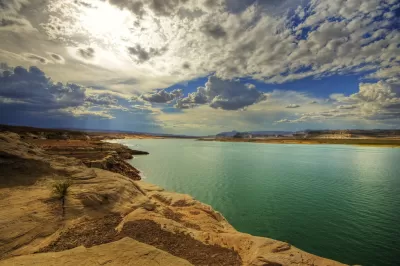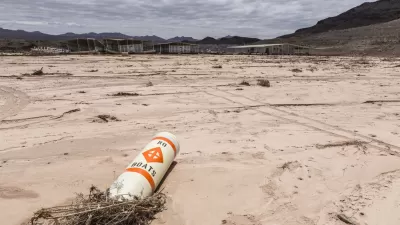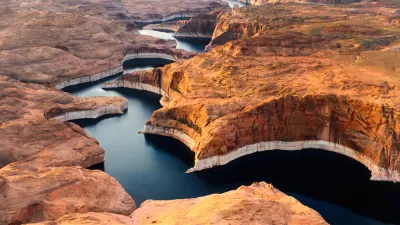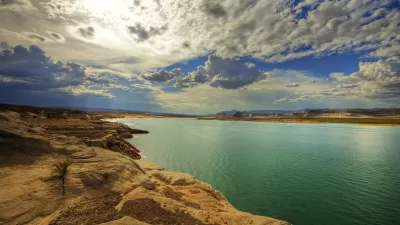As climate changes in the Rockies and the southwest, Lake Powell is gradually shrinking. The debate over Glen Canyon Dam is on again, and this time environmentalists aren't the only ones against it.

The Colorado River has played host to infrastructural drama for almost a century. Now, amidst drought, its formerly vast water supply is shrinking. A debate has reignited "about whether 20th-century solutions can address the challenges of an epochal 21st-century drought, with a growing chorus of prominent former officials saying the plans fly in the face of a new climate reality."
One of the main criticisms is that Lake Powell (and Lake Mead) waste immense quantities of water. Abrahm Lustgarden describes that in what is "perhaps the most egregious failure for a system intended to conserve water, many [reservoirs] lose hundreds of billions of gallons of precious water each year to evaporation and, sometimes, to leakage underground." Phasing out Glen Canyon Dam would save about 179 billion gallons of water a year, enough to supply Los Angeles.
Moreover, Glen Canyon Dam's venerable hydroelectric capacity is declining as climate change plays havoc with its reservoir's water level. "Since the dam's power sales are relied on to pay for the operations of other smaller dams and reservoirs used for irrigation in the West, as Glen Canyon financially crumbles, so might the system that depends on it."
Lustgarden notes that in 2015 alone, six smaller dams were deconstructed in the western states, with four more on the Klamath River on their way out. But the politics around Glen Canyon and the Colorado River are on another level entirely, and so far there hasn't been any real movement on the issue.
FULL STORY: Drought Be Damned: Has the 20th-Century Promise of America’s Dams Run Its Course?

Planetizen Federal Action Tracker
A weekly monitor of how Trump’s orders and actions are impacting planners and planning in America.

Congressman Proposes Bill to Rename DC Metro “Trump Train”
The Make Autorail Great Again Act would withhold federal funding to the system until the Washington Metropolitan Area Transit Authority (WMATA), rebrands as the Washington Metropolitan Authority for Greater Access (WMAGA).

The Simple Legislative Tool Transforming Vacant Downtowns
In California, Michigan and Georgia, an easy win is bringing dollars — and delight — back to city centers.

The States Losing Rural Delivery Rooms at an Alarming Pace
In some states, as few as 9% of rural hospitals still deliver babies. As a result, rising pre-term births, no adequate pre-term care and "harrowing" close calls are a growing reality.

The Small South Asian Republic Going all in on EVs
Thanks to one simple policy change less than five years ago, 65% of new cars in this Himalayan country are now electric.

DC Backpedals on Bike Lane Protection, Swaps Barriers for Paint
Citing aesthetic concerns, the city is removing the concrete barriers and flexposts that once separated Arizona Avenue cyclists from motor vehicles.
Urban Design for Planners 1: Software Tools
This six-course series explores essential urban design concepts using open source software and equips planners with the tools they need to participate fully in the urban design process.
Planning for Universal Design
Learn the tools for implementing Universal Design in planning regulations.
Smith Gee Studio
City of Charlotte
City of Camden Redevelopment Agency
City of Astoria
Transportation Research & Education Center (TREC) at Portland State University
US High Speed Rail Association
City of Camden Redevelopment Agency
Municipality of Princeton (NJ)





























